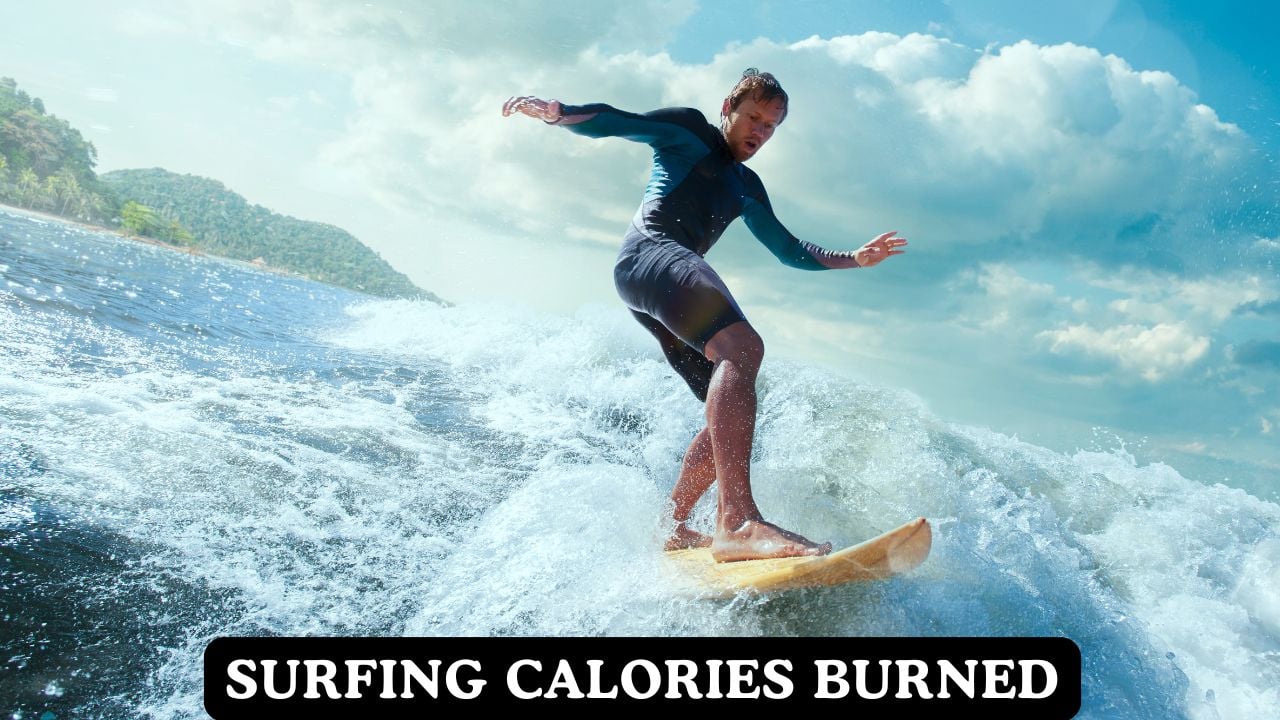🏄♂️ Surfing Calories Burned Calculator
Calculate calories burned during surfing sessions and wave riding

How Many Calories Does Surfing Burn?
Surfing can burn between 180-560 calories per hour, depending on wave conditions, water temperature, your skill level, and body weight. A typical 60-minute surfing session burns approximately 300-400 calories for most intermediate surfers. Surfing is classified as a moderate-to-vigorous cardiovascular activity (3.0-7.0 METs) that combines paddling, balance, core strength, and wave reading skills. The constant paddling to catch waves, maintaining balance on the board, and maneuvering through different wave conditions creates an excellent full-body workout that burns calories while building functional strength. This makes surfing an outstanding complement to regular home workouts for comprehensive fitness and ocean-based wellness.
🌊 The Science Behind Surfing Calorie Burn
Surfing is a unique form of exercise that demands both cardiovascular endurance and muscular strength. The majority of surfing time is spent paddling, which primarily uses the shoulders, back, and core muscles in a sustained aerobic effort. Wave riding itself requires explosive power, balance, and coordination, engaging the entire body in short, intense bursts.
Research shows that surfing combines elements of swimming, gymnastics, and resistance training. The unpredictable nature of waves means your muscles constantly adapt and respond, leading to improved functional fitness and higher calorie burn. The ocean environment also provides natural resistance and requires additional energy for thermoregulation, especially in cooler waters. For comprehensive fitness development, combine surfing with targeted muscle recovery techniques and physical fitness routines.
🏄♂️ Factors Affecting Surfing Calorie Burn
Wave Size and Conditions: Larger waves require more paddling power and energy to catch and ride, increasing calorie burn by up to 30% compared to small waves.
Water Temperature: Cold water can increase energy expenditure by 10-20% as your body works to maintain core temperature. Tropical waters reduce thermal stress but still provide excellent exercise.
Board Type: Longboards require more paddling effort but offer easier wave catching. Shortboards demand more skill and energy for maneuverability but are more efficient for experienced surfers.
Skill Level: Beginners typically burn more calories due to inefficient movements and more time paddling. Advanced surfers are more efficient but can ride more challenging waves. Building core strength and leg power helps improve surfing efficiency.
Session Duration: Longer sessions increase total calorie burn but may see decreased intensity over time. Understanding your body composition helps optimize training and performance.
Surfing Calorie Burn Reference Tables
Calories Burned by Duration & Skill Level (150 lbs / 68 kg person)
| Duration | Beginner (3.0 MET) |
Recreational (4.0 MET) |
Intermediate (5.0 MET) |
Advanced (6.0 MET) |
Expert (7.0 MET) |
|---|---|---|---|---|---|
| 30 minutes | 90 calories | 120 calories | 150 calories | 180 calories | 210 calories |
| 60 minutes | 180 calories | 240 calories | 300 calories | 360 calories | 420 calories |
| 90 minutes | 270 calories | 360 calories | 450 calories | 540 calories | 630 calories |
| 120 minutes | 360 calories | 480 calories | 600 calories | 720 calories | 840 calories |
Calories Burned by Body Weight (60 minutes, intermediate surfing)
| Body Weight | Moderate Waves | Large Waves | Cold Water | Challenging Conditions |
|---|---|---|---|---|
| 125 lbs / 57 kg | 250 calories | 275 calories | 300 calories | 325 calories |
| 150 lbs / 68 kg | 300 calories | 330 calories | 360 calories | 390 calories |
| 175 lbs / 79 kg | 350 calories | 385 calories | 420 calories | 455 calories |
| 200 lbs / 91 kg | 400 calories | 440 calories | 480 calories | 520 calories |
Wave Size Impact on Calorie Burn (150 lbs / 68 kg, 60 minutes, intermediate)
| Wave Size | Description | Calories Burned | % Increase vs Small |
|---|---|---|---|
| Small (1-2 feet) | Easy conditions, mostly paddling | 270 calories | Baseline |
| Moderate (2-4 feet) | Standard surfing conditions | 300 calories | +11% |
| Good (4-6 feet) | Optimal surfing waves | 330 calories | +22% |
| Large (6-8 feet) | Challenging conditions | 360 calories | +33% |
| Big (8+ feet) | Extreme conditions | 390 calories | +44% |
Water Temperature Effect on Calorie Burn (150 lbs / 68 kg, 60 minutes)
| Water Temperature | Thermal Effect | Calories Burned | Wetsuit Required |
|---|---|---|---|
| Cold (below 60°F) | High energy for thermoregulation | 360 calories | Full wetsuit (4/3mm+) |
| Cool (60-68°F) | Moderate thermal stress | 330 calories | Spring suit (3/2mm) |
| Moderate (68-75°F) | Comfortable conditions | 300 calories | Spring suit or rashguard |
| Warm (75-80°F) | Minimal thermal stress | 295 calories | Rashguard optional |
| Tropical (80°F+) | No thermal challenge | 285 calories | Board shorts/bikini |
⚕️ Important Health Notice
This surfing calorie calculator provides estimates based on exercise physiology research and metabolic calculations. Individual results may vary based on factors including fitness level, technique, wave conditions, equipment, and personal physiology. Always surf within your skill level and current ocean conditions. Surfing involves inherent risks including drowning, injury from equipment or marine life, and changing ocean conditions.
Scientific Validation: This calculator uses MET values from the Compendium of Physical Activities (3.0-7.0 MET range) specifically for surfing activities, combined with the WHO-endorsed Schofield equation for accurate BMR calculations. Environmental factors are based on research showing wave size, water temperature, and equipment effects on energy expenditure during ocean-based activities.
